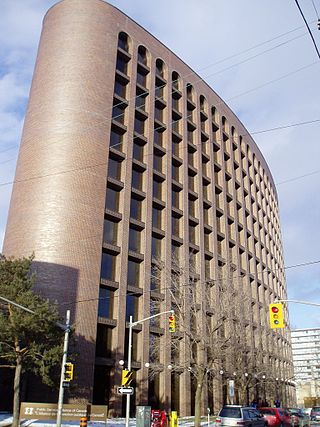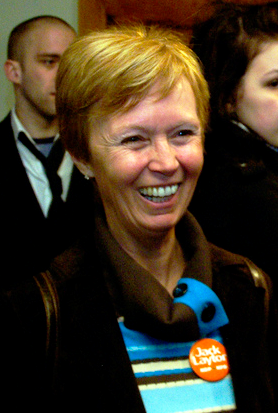
The Canadian Labour Congress, or CLC is a national trade union centre, the central labour body in Canada to which most Canadian labour unions are affiliated.
The Canadian Union of Public Employees is a Canadian trade union serving the public sector – although it has in recent years organized workplaces in the non-profit and para-public sector as well. CUPE–SCFP is the largest union in Canada, representing some 700,000 workers in health care, education, municipalities, libraries, universities, social services, public utilities, transportation, emergency services and airlines. Over 60 per cent of CUPE–SCFP's members are women, and almost a third are part-time workers. CUPE–SCFP is affiliated with the Canadian Labour Congress and is its greatest financial contributor.

The Fédération des travailleurs et travailleuses du Québec is the largest labour federation in Quebec in terms of its membership. It has over 500,000 members, who account for 44% of the unionised workers in Quebec. This ratio is 60% in the private sector, in which most members work. It also has many members in government agencies.
Nunavut Tunngavik Incorporated is the legal representative of the Inuit of Nunavut for the purposes of native treaty rights and treaty negotiation. The presidents of NTI, Makivik Corporation, Nunatsiavut, and the Inuvialuit Regional Corporation, the four regional land claims organizations, govern the national body, the Inuit Tapiriit Kanatami (ITK) as its board of directors. NTI continues to play a central role in Nunavut, even after the creation of the Government of Nunavut. As the successor of the Tunngavik Federation of Nunavut, which was a signatory of the Nunavut Land Claims Agreement on behalf of Inuit, NTI is responsible for ensuring that the Nunavut Land Claims Agreement is implemented fully by the Government of Canada and the Government of Nunavut and that all parties fulfill their obligations.
The Northern Territories Federation of Labour (NTFL), affiliated to the Canadian Labour Congress, represents workers in the Northwest Territories and Nunavut. The federation was founded in 1980 and represents 9,000 workers in 17 affiliated trade unions.
John Gordon was the president of Public Service Alliance of Canada, a public service union in Canada. John Gordon first joined PSAC in 1974 as a tradesperson with Public Works Canada.
The Labor Council for Latin American Advancement (LCLAA) is a nonprofit, nonpartisan Latino organization affiliated with the AFL-CIO and the Change to Win federation. It was founded in 1972 to provide Latino trade union members in the United States with a more effective voice within the AFL-CIO, to encourage Latino participation in the democratic process, and to encourage the organization of Latino workers into labor unions.
The Union of National Defence Employees is a component of the Public Service Alliance of Canada.

SEIU Healthcare is a Canadian trade union representing more than 60,000 workers in Ontario, Canada. Through collective bargaining, the union represents workers in hospitals, home care, nursing and retirement homes, and community services. The union has been active in Ontario for over 70 years.
James Calbert Best was a Canadian diplomat. He was High Commissioner to Trinidad and Tobago. He was Canada's first Black assistant deputy minister and first Black high commissioner.

The Public Service Alliance of Canada Building is a modernist elliptical office building in Ottawa, Ontario, constructed in 1968 as the national headquarters for the Public Service Alliance of Canada. Designed by Paul Schoeler of Schoeler & Heaton Architects, the 12-storey building is located at the intersection of Gilmour and Metcalfe. The building was a recipient of an Ontario Association of Architects Award. In 2000, the Royal Architectural Institute of Canada chose the building as one of the top 500 buildings produced in Canada during the last millennium.

Nycole Turmel is a Canadian politician who served as the member of Parliament (MP) for Hull—Aylmer from 2011 to 2015. A member of the New Democratic Party (NDP), Turmel served as the party's interim leader from 2011 to 2012.
The Canadian federal budget for fiscal year 2012–13 was presented to the House of Commons of Canada by Finance Minister Jim Flaherty on 29 March 2012. Among the most notable elements of the federal budget were changes to Old Age Security and a reduction of the budget for the Canadian Forces and the Canadian Broadcasting Corporation.
The Union of Taxation Employees (UTE) represents more than 30,000 employees of Canada Revenue Agency. It is a component of Public Service Alliance of Canada. It is organized into 60 Locals, from St. John's to Victoria.

The Agriculture Union is an affiliate of the Public Service Alliance of Canada (PSAC). It has more than 8,000 members who work for Canadian federal government departments and agencies such as the:

Nicholas Marcus Thompson is a Trinidadian-Canadian human rights advocate, union leader, and influential figure in the fight against systemic discrimination in Canada. Thompson has been at the forefront of advocating for the rights of Black Canadians, most notably through organizing the landmark $2.5 billion Black Class Action lawsuit against the federal Government of Canada. This lawsuit, filed on behalf of about 45,000 Black federal employees, challenged systemic discrimination in hiring and promotions, leading to profound changes in Canada’s employment legislation.
The Canada Employment and Immigration Union (CEIU) is a Canadian labour union, with over 30,000 members from across every Canadian Province and Territory. CEIU is affiliated with the Public Service Alliance of Canada (PSAC), and all CEIU members are automatically members of the PSAC. As affiliated, the PSAC is the bargaining agent for CEIU and other component unions for negotiations with the Treasury Board. CEIU is a member of the Program and Administrative Services (PA) group.

The 2023 Canadian federal worker strike was a strike by Canadian federal workers who are members of the Public Service Alliance of Canada (PSAC). The strike took place between April 19 and May 3, 2023, although the Treasury Board bargaining units ended their strike on May 1.
Christopher Dale Joseph Aylward is a Canadian trade union leader. From St. John's, Newfoundland, Aylward has been national president of the Public Service Alliance of Canada (PSAC) since 2018. Prior to being elected president, He served as PSAC's national executive vice-president from 2012 to 2018. He began his career in the labour movement as a shop steward with PSAC affiliate Union of Taxation Employees while working at the St. John's Taxation Centre. He led PSAC during the 2023 Canadian federal worker strike, a two weeklong national work stoppage.
The 1991 Public Service Alliance of Canada strike was a strike by federal public sector workers in Canada, represented by the Public Service Alliance of Canada.









